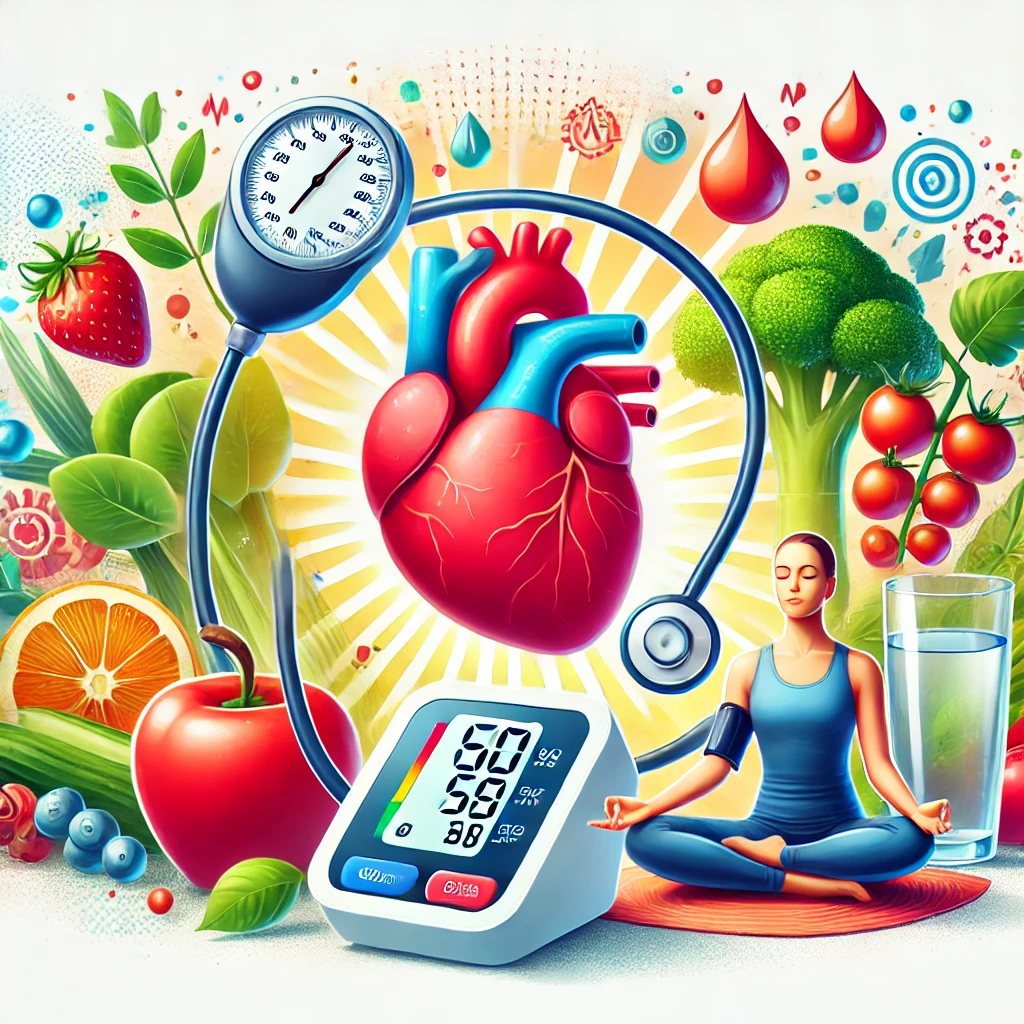How to Lower Blood Pressure with effective and natural methods. Discover simple lifestyle changes for a healthier heart and improved well-being.

Natural Methods to Lower Blood Pressure Without Medication
Managing your blood pressure naturally involves a holistic approach that combines lifestyle modifications, dietary choices, and stress reduction techniques. High blood pressure affects millions of people worldwide, and many individuals seek alternatives to medication for long-term health management.
How to Lower Blood Pressure – Understanding Blood Pressure Basics
Your blood pressure represents the force of blood against your artery walls. When this pressure remains consistently high, it can lead to serious health complications like heart disease, stroke, and kidney problems. Fortunately, numerous natural strategies can help you maintain healthy blood pressure levels.
Dietary Interventions for Blood Pressure Control
Diet plays a crucial role in managing blood pressure. Consider implementing these nutritional strategies:
• Reduce sodium intake to less than 2,300 mg daily • Increase potassium-rich foods like bananas, spinach, and avocados • Consume more heart-healthy foods • Limit processed and packaged foods • Incorporate whole grains and lean proteins
Exercise and Physical Activity
Regular physical activity is a powerful tool for lowering blood pressure. Aim for:
• 150 minutes of moderate aerobic exercise weekly • Strength training 2-3 times per week • Walking, swimming, cycling, or dancing • Gradual intensity increase based on your fitness level
Stress Management Techniques
Chronic stress contributes significantly to elevated blood pressure. Effective stress reduction methods include:
• Meditation and mindfulness practices • Deep breathing exercises • Yoga • Regular sleep schedule • Limiting caffeine and alcohol consumption
Weight Management Strategies
Maintaining a healthy weight directly impacts blood pressure. Key approaches include:
• Calculating and monitoring your body mass index (BMI) • Creating a balanced caloric deficit • Regular physical activity • Portion control • Consulting with nutritionists for personalized guidance
Natural Supplements and Herbal Remedies
Some natural supplements can support blood pressure management:
• Garlic supplements • Omega-3 fatty acids • CoQ10 • Hibiscus tea • Beetroot juice
Lifestyle Modifications
Comprehensive lifestyle changes can significantly improve blood pressure:
• Quit smoking • Limit alcohol consumption • Practice good sleep hygiene • Reduce workplace and personal stress • Regular health check-ups
Monitoring and Tracking Progress
Consistently track your blood pressure using:
• Home blood pressure monitors • Digital tracking apps • Regular medical check-ups • Maintaining a health journal
When to Seek Professional Guidance
While natural methods are effective, always consult healthcare professionals if:
• Blood pressure remains consistently high • You experience unusual symptoms • Existing medical conditions complicate management • Considering significant lifestyle changes
Centers for Disease Control and Prevention recommends a comprehensive approach to blood pressure management.
American Heart Association provides additional resources for understanding and managing blood pressure naturally.
Remember, sustainable blood pressure management requires patience, consistency, and a holistic approach. Individual results may vary, so personalized strategies are essential for long-term success.
Diet and Nutrition Strategies for Reducing Hypertension
Key Nutritional Approaches for Blood Pressure Management
The American Heart Association recommends several dietary strategies that can significantly impact blood pressure levels. Understanding which foods to incorporate and which to limit can make a substantial difference in your overall health.
Potassium-Rich Food Selection
- Bananas
- Sweet potatoes
- Spinach
- White beans
- Avocados
Potassium helps counteract sodium’s negative effects and supports healthy blood pressure regulation. These foods can naturally assist in reducing hypertension risk by promoting electrolyte balance.
Sodium Reduction Strategies
Limiting sodium intake is crucial for blood pressure control. Experts recommend consuming less than 2,300 milligrams daily. Choose fresh ingredients over processed foods and read nutrition labels carefully to monitor sodium consumption.
Recommended Low-Sodium Alternatives
- Fresh herbs for seasoning
- Homemade meals
- Low-sodium condiments
- Fresh produce instead of canned options
Mediterranean Diet Benefits
The Mediterranean diet has demonstrated exceptional results in managing blood pressure. This dietary approach emphasizes:
- High consumption of fruits and vegetables
- Whole grains
- Lean protein sources
- Healthy fats like olive oil
- Limited red meat intake
Lifestyle Considerations
Beyond diet, complementary lifestyle modifications enhance blood pressure management. Regular physical activity, stress reduction techniques, and adequate sleep contribute significantly to maintaining healthy blood pressure levels.
Hydration and Blood Pressure
Proper hydration supports cardiovascular function. Water helps maintain blood volume and assists kidney function in sodium elimination. Aim for 8-10 glasses of water daily, reducing caffeine and alcohol consumption.
Supplemental Nutritional Support
Certain supplements may provide additional blood pressure support. Consult with healthcare professionals before incorporating:
- Magnesium
- Omega-3 fatty acids
- Coenzyme Q10
Monitoring and Professional Guidance
Regular blood pressure monitoring remains essential. Schedule periodic check-ups with your healthcare provider to track progress and receive personalized dietary recommendations.
By implementing these strategic dietary approaches, individuals can proactively manage their blood pressure and reduce potential cardiovascular risks. Consistent, mindful nutrition combined with lifestyle modifications offers a comprehensive path to optimal heart health.
Exercise Techniques That Effectively Manage Blood Pressure
Cardiovascular Exercises for Optimal Blood Pressure Control
Aerobic activities are particularly effective in lowering blood pressure. Walking, swimming, cycling, and jogging can help strengthen your heart and improve blood flow. Aim for at least 150 minutes of moderate-intensity exercise per week, breaking it down into 30-minute sessions five days a week.
Recommended Cardiovascular Techniques
- Brisk walking for 30 minutes daily
- Swimming laps 3-4 times per week
- Cycling on flat terrain or stationary bike
- Low-impact dancing or aerobic classes
Strength Training Benefits
Contrary to popular belief, resistance training can also help manage blood pressure when performed correctly. Light to moderate weight training can improve overall cardiovascular function and metabolic health. Focus on compound movements that engage multiple muscle groups and maintain proper breathing techniques.
Safe Strength Training Approaches
- Use lighter weights with higher repetitions
- Avoid holding breath during lifts
- Maintain consistent breathing patterns
- Start with bodyweight exercises
Yoga and Relaxation Techniques
Mind-body exercises like yoga and meditation can significantly reduce stress-related blood pressure spikes. These practices help lower cortisol levels and promote relaxation, which directly impacts cardiovascular health. Gentle stretching and controlled breathing exercises can be particularly beneficial.
Recommended Yoga Practices
- Hatha yoga
- Restorative yoga
- Breathing meditation
- Progressive muscle relaxation
High-Intensity Interval Training (HIIT) Considerations
Short, intense workout bursts can be effective for blood pressure management. However, individuals with existing hypertension should consult their healthcare provider before starting HIIT. These workouts should be carefully monitored and gradually introduced to prevent potential cardiovascular stress.
Important Precautions
Before beginning any exercise program, consult with your healthcare professional. Some individuals may require modified approaches based on their current health status, medications, and overall fitness level.
Monitoring Techniques
- Check blood pressure before and after exercise
- Watch for unusual fatigue or discomfort
- Stay hydrated during physical activities
- Listen to your body’s signals
Additional Resources
For more detailed information, consider consulting these authoritative sources:
Consistent exercise, combined with a balanced diet and stress management, can be a powerful approach to naturally managing blood pressure. Remember that individual results may vary, and personalized medical guidance is always recommended.
Stress Reduction and Its Impact on Cardiovascular Health
Physiological Mechanisms of Stress-Induced Blood Pressure
The autonomic nervous system plays a critical role in managing stress-related cardiovascular responses. Sympathetic nervous system activation leads to immediate physiological changes, including:
- Increased heart rate
- Narrowed blood vessels
- Enhanced hormone production
- Elevated metabolic processes
Proven Stress Reduction Techniques
Implementing targeted stress management strategies can significantly mitigate cardiovascular risks. Mindfulness meditation has demonstrated remarkable effectiveness in reducing systolic and diastolic blood pressure. Regular practice helps regulate emotional responses and promotes physiological balance.
Deep breathing exercises offer another powerful intervention. By practicing controlled respiratory techniques, individuals can activate the parasympathetic nervous system, which counteracts stress-induced physiological reactions. Techniques like diaphragmatic breathing and 4-7-8 breathing method can lower blood pressure within minutes.
Lifestyle Modifications for Comprehensive Management
Regular physical activity emerges as a fundamental approach to stress reduction and blood pressure control. Engaging in moderate exercise like walking, swimming, or cycling for 30 minutes daily can dramatically improve cardiovascular resilience. Exercise stimulates endorphin production, naturally combating stress hormones.
Nutrition plays an equally crucial role in managing stress-related cardiovascular challenges. Consuming a diet rich in potassium, magnesium, and omega-3 fatty acids helps regulate blood pressure. Foods like leafy greens, fatty fish, nuts, and whole grains provide essential nutrients that support heart health.
Sleep and Stress Interconnection
Quality sleep represents a critical yet often overlooked component of stress management. Inadequate sleep disrupts hormonal balance and increases inflammatory markers, directly impacting blood pressure. Establishing consistent sleep routines and creating a relaxing bedtime environment can significantly improve overall cardiovascular wellness.
Professional Support and Monitoring
While self-management strategies are essential, professional medical guidance remains paramount. Regular check-ups and comprehensive cardiovascular assessments help individuals understand their unique physiological responses and develop personalized stress management plans.
For additional resources and expert guidance, consider exploring these reputable websites:
Integrating holistic approaches—encompassing psychological, nutritional, and physical interventions—provides the most comprehensive strategy for managing stress-induced cardiovascular challenges. By recognizing the interconnected nature of mental and physical health, individuals can develop resilient strategies for long-term wellness.
Lifestyle Modifications for Long-Term Blood Pressure Control
Managing blood pressure requires a comprehensive approach that goes beyond medication. By implementing strategic lifestyle changes, you can significantly improve your cardiovascular health and maintain optimal blood pressure levels.
Understanding Dietary Impact on Blood Pressure
Your diet plays a crucial role in blood pressure management. The American Heart Association recommends focusing on nutrient-rich foods that support heart health. Consider incorporating:
- Potassium-rich vegetables like spinach and sweet potatoes
- Lean proteins such as fish and skinless poultry
- Whole grains that provide essential fiber
- Low-fat dairy products
Reducing sodium intake is equally important. Aim to consume less than 2,300 mg daily, with an ideal target of 1,500 mg for most adults. Reading nutrition labels and avoiding processed foods can help you achieve this goal.
Exercise as a Powerful Blood Pressure Regulator
Physical activity is a powerful tool for maintaining healthy blood pressure. The CDC recommends at least 150 minutes of moderate-intensity aerobic exercise per week. This can include:
- Brisk walking
- Swimming
- Cycling
- Dancing
- Strength training exercises
Regular exercise helps strengthen your heart, allowing it to pump blood more efficiently with less effort, thereby reducing pressure on your arteries.
Stress Management Techniques
Chronic stress contributes significantly to elevated blood pressure. Implementing stress reduction strategies can provide substantial benefits:
- Practice daily meditation
- Engage in deep breathing exercises
- Consider yoga or tai chi
- Maintain consistent sleep patterns
The Mayo Clinic emphasizes that consistent stress management can lead to significant improvements in cardiovascular health.
Weight Management Strategies
Maintaining a healthy weight directly correlates with blood pressure control. Even modest weight loss can dramatically reduce your blood pressure. Focus on:
- Calculating and maintaining a healthy body mass index (BMI)
- Creating a sustainable calorie deficit
- Combining dietary modifications with regular exercise
Limiting Alcohol and Tobacco
Excessive alcohol consumption and smoking can substantially increase blood pressure. Consider these recommendations:
- Limit alcohol to no more than one drink per day for women and two for men
- Seek professional help to quit smoking
- Avoid secondhand smoke exposure
Monitoring and Professional Guidance
Regular blood pressure monitoring is essential. Utilize home monitoring devices and schedule routine check-ups with healthcare professionals. The American Heart Association provides extensive resources for tracking and understanding your bp readings.
Implementing these lifestyle modifications requires commitment and patience. Each small change contributes to your overall cardiovascular health, potentially reducing the need for medication and improving your quality of life.
Remember that individual responses vary, so consulting with healthcare professionals can help you develop a personalized approach to blood pressure management.
Watch the video below:
Conclusion
Taking control of your bp is a holistic journey that requires commitment and consistent effort across multiple aspects of your life. By integrating natural methods, dietary choices, regular exercise, stress management, and thoughtful lifestyle modifications, you can significantly improve your cardiovascular health and reduce hypertension risks.
Your path to lower bp isn’t about quick fixes, but sustainable changes. Each strategy you implement – whether it’s choosing heart-healthy foods, engaging in regular physical activity, practicing stress reduction techniques, or making mindful lifestyle adjustments – contributes to a comprehensive approach to managing your blood pressure.
Remember that small, progressive steps can lead to substantial health improvements. Start by implementing one or two strategies at a time, gradually building a comprehensive wellness routine. Track your progress, consult with healthcare professionals, and stay motivated by celebrating incremental achievements.
The power to manage your BP lies within your daily choices. By understanding the interconnectedness of diet, exercise, stress, and lifestyle, you can create a robust framework for cardiovascular health. While medication might be necessary for some, these natural approaches can often complement medical treatments and potentially reduce reliance on pharmaceutical interventions.
Ultimately, lowering bp is about investing in your long-term health and quality of life. Stay informed, remain proactive, and view your health journey as an ongoing commitment to yourself. Your heart will thank you for the dedicated care and attention you provide through these comprehensive strategies.



